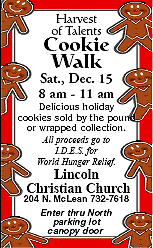|
New 911 Dispatch Center Put to the Test
 Send a link to a friend
Send a link to a friend
[December 04, 2007]
Three days up and running, and
the new 911 dispatch center has been put to the test, big-time. The
room where 911 emergency calls are received and appropriate help is
sent out had just reopened in a new location and with lots of new
equipment when the ice storm hit on Saturday. The new center was
bombarded with calls all day long, manager Dan Fulscher said.
|
 Saturday was a time to not only to test new equipment, but also a
new dispatch position. The normally two-man communications operation
was set up for a third dispatcher to be added when there might be
high call volume. Saturday was a time to not only to test new equipment, but also a
new dispatch position. The normally two-man communications operation
was set up for a third dispatcher to be added when there might be
high call volume.
Calls began from the time conditions became slick, around 10 a.m.
Dispatcher Mark Mann came in at about 11 a.m. on Saturday and filled
the third chair. The calls continued all day. "We were jammed with
callers and were handling them as they came in," he said. He was
glad to say, "We didn't drop any calls."
The dispatchers receive 911 calls for help. With the caller still
on the line, they contact the appropriate agencies to send out.
Agencies listen for call-outs. The frequency that everyone
listens to was so busy at times that some agencies went to their own
isolated frequency for additional communications between themselves.
All area law enforcement, fire and rescue squads, and the
paramedics were busy all day.
[to top of second column]
 |

Mann, a 30-year police veteran and dispatch supervisor, said that
Saturday afternoon was "the worst day ever as far as calls."
Fulscher, the Logan County Emergency Management Agency director
and communication room dispatch manager, said that the high number
of calls was likely due to a number of factors. The first winter
storm is always hectic. We went from a month of warm weather to
winter. There was also a high incidence of non-weather-related
calls: domestic disputes, health issues, a request for investigation
assistance by an out-of-state police agency.
The Logan County Paramedic Association logged 22 responses due to
ice-related falls or crashes. They had 32 calls for the day.
Weekends, which are higher on average than weekdays, normally have
10 to 15 calls. Some are transfers from hospital to hospital or to
other institutions.
As far as the new call center goes, "it tested real well,"
Fulscher said.
[By JAN YOUNGQUIST]
 |